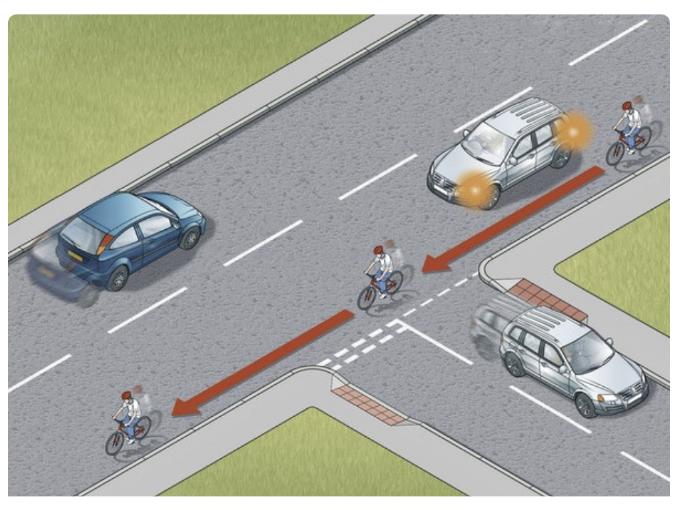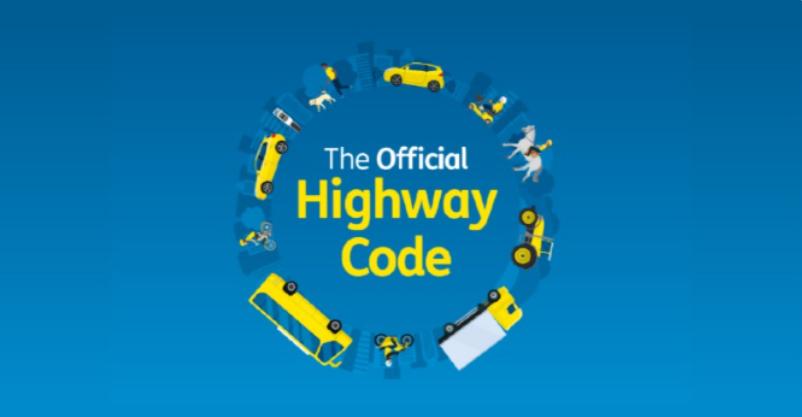- News
- Reviews
- Bikes
- Components
- Bar tape & grips
- Bottom brackets
- Brake & gear cables
- Brake & STI levers
- Brake pads & spares
- Brakes
- Cassettes & freewheels
- Chains
- Chainsets & chainrings
- Derailleurs - front
- Derailleurs - rear
- Forks
- Gear levers & shifters
- Groupsets
- Handlebars & extensions
- Headsets
- Hubs
- Inner tubes
- Pedals
- Quick releases & skewers
- Saddles
- Seatposts
- Stems
- Wheels
- Tyres
- Tubeless valves
- Accessories
- Accessories - misc
- Computer mounts
- Bags
- Bar ends
- Bike bags & cases
- Bottle cages
- Bottles
- Cameras
- Car racks
- Child seats
- Computers
- Glasses
- GPS units
- Helmets
- Lights - front
- Lights - rear
- Lights - sets
- Locks
- Mirrors
- Mudguards
- Racks
- Pumps & CO2 inflators
- Puncture kits
- Reflectives
- Smart watches
- Stands and racks
- Trailers
- Clothing
- Health, fitness and nutrition
- Tools and workshop
- Miscellaneous
- Buyers Guides
- Features
- Forum
- Recommends
- Podcast
news
 Highway Code changes (Tier press release)
Highway Code changes (Tier press release)Highway Code: One-in-four drivers still don't know correct rule on cyclist priority
New research into drivers' knowledge of changes to the Highway Code has raised concern, a survey estimating that 25 per cent of drivers do not know the correct rules on pedestrian and cyclist priority.
The research comes courtesy of Tier, the world's largest shared micro-mobility operator, who surveyed motorists ahead of Car-Free Day and have now called for better awareness of the Highway Code changes and hierarchy of road users.
> The Highway Code for cyclists — all the rules you need to know for riding on the road explained
Changes were implemented in January 2022 to better protect vulnerable road users, and include establishing a hierarchy of road users with those most vulnerable (pedestrians, cyclists and horse riders) placed at the top, as well as giving cyclists and those on foot priority in situations such as the ones illustrated below.
However, Tier's survey found that one-in-four drivers were incorrect or unable to answer on questions of pedestrian and cyclist priority and incorrectly believe that those driving vehicles have priority over cyclists and pedestrians when turning onto a side road.
Furthermore less than half of drivers correctly identified pedestrians as having priority, that despite the two-year anniversary of the Highway Code changes approaching this winter.
The Highway Code states:
You should not cut across cyclists, horse riders or horse-drawn vehicles going ahead when you are turning into or out of a junction or changing direction or lane
More than a third of drivers surveyed wrongly believed drivers have priority when turning into a side road, while one-in-five said they were not sure who has priority.
Jessica Murphy, Head of Public Policy UKI at Tier, said the results of the survey were troubling, and demonstrate the need to further raise awareness of the changes to avoid dangerous interactions on Britain's roads.
She said: "The findings highlight how well-meaning changes to the Highway Code still put the onus on cyclists and other vulnerable road users to be aware of drivers. Currently the majority of drivers should give cyclists their legal right of way, however a quarter will not, which could lead to potentially devastating outcomes.
"We hope that by raising awareness of the changes more drivers will hear about the changes and drive according to the Highway Code, making our roads safer to cycle on, especially in urban areas and reduce conflict between road users."
The changes to the Highway Code were brought in 20 months ago and prompted much discussion and hysteria at the time. Just days before the revisions came into force, two major newspapers misrepresented the rules around the 'Dutch Reach' technique, designed to reduce the chances of dooring a cyclist.
A further concern came with the lack of communication of the changes to the public, Cycling UK at the time calling for a long-term public awareness campaign to help produce a "mindset shift" on British roads. It took until July, six months after they came into effect, for the changes to be promoted in a THINK! road safety campaign.
And Tier's research is hardly surprising considering the news a year ago that an AA survey showed that 61 per cent of drivers had not read the new rules.
"While we are pleased that many of the changes can be successfully recalled, we'd like more drivers to know the rules outright so they can keep themselves and others safe," the managing director of AA Accident Assist, Tim Rankin, said.
Dan is the road.cc news editor and joined in 2020 having previously written about nearly every other sport under the sun for the Express, and the weird and wonderful world of non-league football for The Non-League Paper. Dan has been at road.cc for four years and mainly writes news and tech articles as well as the occasional feature. He has hopefully kept you entertained on the live blog too.
Never fast enough to take things on the bike too seriously, when he's not working you'll find him exploring the south of England by two wheels at a leisurely weekend pace, or enjoying his favourite Scottish roads when visiting family. Sometimes he'll even load up the bags and ride up the whole way, he's a bit strange like that.
Latest Comments
- BikingBud 5 min 25 sec ago
I agree he is a perfect contrarian but being contrary and controversial actually clears the decks somewhat and shows that most arguments are wholly...
- the little onion 10 min 41 sec ago
At least in part, it is because active infrastructure is put in WITHOUT sufficient attention to unequal gender impacts. The classic unlit towpath...
- BikingBud 21 min 1 sec ago
Thnaks for the link @mitsky ...
- mctrials23 21 min 36 sec ago
Exactly. They hate cyclists. They don't care what they have to hang their hatred on and their average reader is too thick or doesn't want to see...
- Secret_squirrel 36 min 29 sec ago
This is my favourite rant - but I really dont see the point of windproof cycling clobber that isn't properly waterproof - especially for the UK. ...
- leedorney 46 min 3 sec ago
Whenever I drive, which isn't much, I often wonder why other seem to just not care at all, it's like so sense and appreciation for any other human...
- chrisotherwise 56 min 14 sec ago
Thanks for all the kind replies. I was back on my bike yesterday and went and had a look at where I had my fall. No obvious diesel on the road or...
- Secret_squirrel 1 hour 2 min ago
The Highways Agency called. They want a billion miles of fence to make cycling safe on the roads. Less brain dead hyperbole please.
- Bob Sprocket 1 hour 3 min ago
Toe clips, now we're talking.
- philhubbard 4 hours 47 min ago
Absolutely not. I work for a cycling company and regularly travel to Europe with a bike, I always get stopped to check if I had products to sell in...


Add new comment
63 comments
It's so hardwired that I shoulder check when wheeling a shopping trolley, or overtaking as a pedestrian.
Also agreed, a regular program of re-testing drivers should be implemented.
That way, we'd have less middle lane hoggers, people might drive more courteously, and the average speed on the roads would hopefully increase as people are more aware and better drivists.
I broadly agree but I think we should manage people's expectations.
The roads are already "safe" so it's likely that this won't "improve" much for any conceivable intervention (given likely cost / public resistance) - without a major shift in our overall focus / goal.
We should test more than once a lifetime. That will be costly and very unpopular. I think it would weed out a small number of drivers who are utterly incompetent and maybe a larger group who feel they're not up to passing a test again. Some of whom may not actually be very bad - they've just reached the "conscious (of) incompetence" level as opposed to "unconscious incompetence".
What it will do is give an opportunity to "update" drivers on the numerous changes since some decades ago and hopefully will change the "climate" e.g. people might be very slightly sharper around driving.
On that - we should make more effort to educate all people when things change. It's not just drivers - their passengers or other observers are important too, never mind other road users. However trying to reach people can get exponentially costly as people don't want to know. Especially about changes they aren't interested in / didn't want!
Another way of providing "feedback" is by making more effort to enforce existing laws. Again through discussions here I now suspect this would not be the quick win many think. We might be able to harness technology and make a greater change but lots of this is down to police / courts - so humans. And (it being the UK and we don't want a police state) ultimately societal attitudes - what we all consider unacceptable.
Pages